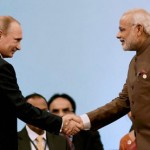President Putin will arrive in New Delhi on 10 December 2014 for the 15th India-Russia Summit. Bolstering trade and energy ties will be high on the agenda for both countries. Amit Bhandari, energy and environment fellow at Gateway House, comments on the current dimensions of the India-Russia energy bilateral and the opportunities for increasing cooperation.
Statement:
“Russia is a key source of energy and nuclear technology for India. It is a primary supplier of nuclear fuel, and a major partner in India’s nuclear energy programme – the Kudankulam 1 and 2 reactors, of 1000 mw each, were set up with assistance from Russia, which is also the technology partner for the Kudankulam 3 and 4 reactors. India’s ONGC has two major investments in Russia – the Sakhalin 2 project and Imperial Energy – worth $5 billion. Gail has signed a long-term LNG supply agreement with Gazprom to purchase 2.5 million tonnes of LNG for 20 years.
Russia is the world’s third largest producer of petroleum and second largest producer of natural gas – it is a major exporter of both the commodities. Western Europe is currently the biggest market for oil and gas from Russia, but the Russians are trying to diversify their export markets due to political tensions regarding Ukraine and Crimea. The recent $400 billion Russia-China gas deal was a part of this initiative, but still ties Russia to a single buyer. Further, the fall in oil and gas prices puts the Russian economy in a vulnerable position as hydrocarbons are their top export. Therefore, it is in Russia’s interest to explore hydrocarbon deals with India.
India and Russia can enter into a long-term LNG supply agreement, which will allow Russia to build up its LNG supply capacity and tap additional markets. The mechanism for such an initiative can include swap agreements with Japan and South Korea – for instance, Russia can supply these two countries with gas, and in return they will provide a cargo owned by them to India, which can come out of Qatar. For this, Russia will need to make large investments in LNG supply terminals – long-term deals will need to become viable.”
For more information or interview requests, please contact Reetika Joshi at joshi.reetika@gatewayhouse.in.


